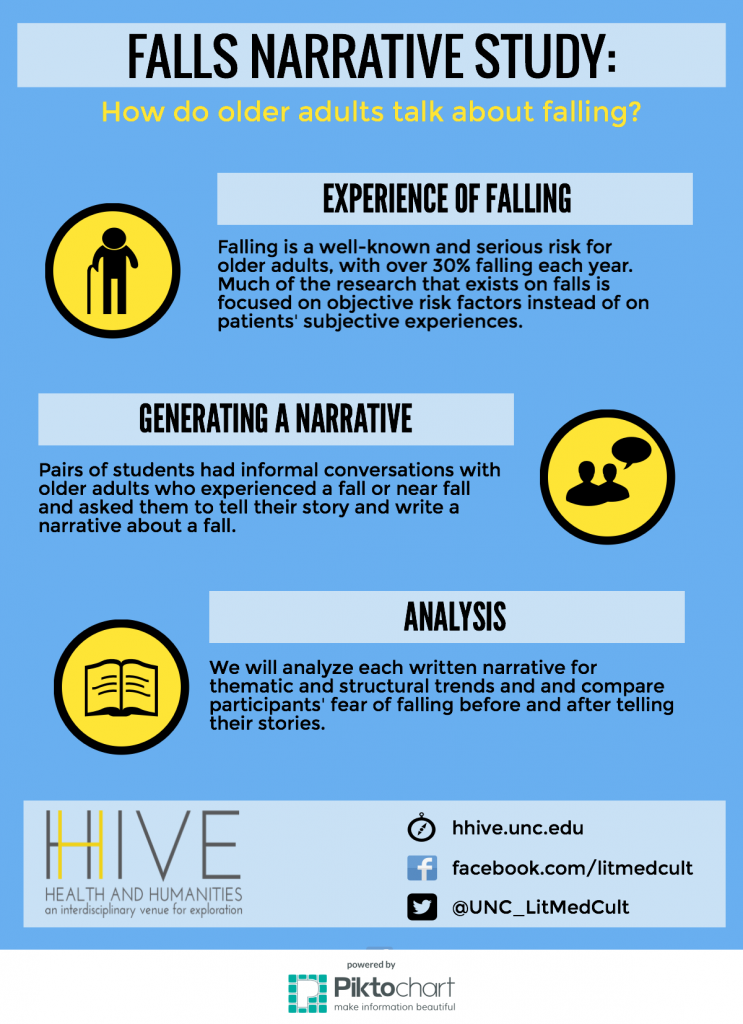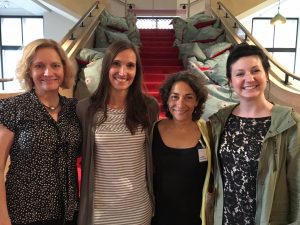Falls Narrative Study
Falling is recognized as a serious risk for older adults, often marking the transitional moment where activity is curtailed, and at times, living independently gives way to assisted or nursing home living. Yet, research on falling in older adults has historically been framed in terms of objective risk factors and rarely designed with the intention of capturing the unique lived experience of the participant. Research that has focused on older adults’ personal experiences of falling has drawn conclusions from transcribed interviews rather than written narratives.
Funded by the Mellon Foundation, The Falls Narrative Study is a feasibility study designed to fill this gap in falls-related research by asking older adults to write a story about a fall or near-fall experience.
- Assess the feasibility of pairing older adults with a student team to generate written narratives about falls.
- Examine how older adults narrate a fall or near-fall experience.
- Compare older adults’ scores on the International Falls Efficacy Scale (FES-I) before and after writing their stories.
- Document how older adults experience telling their stories about falls to health and humanities students.
During the Spring 2016 semester, the HHIVE Lab recruited 11 community-dwelling older adults (ages 75+) who were willing to share their fall story.

Study Coordinators met with each participant to obtain informed consent and administer the baseline FES-I. Next, two students from a joint graduate and undergraduate course, ENGL 695: Health and Humanities: Intensive Research Practice, were paired with an older adult.
Student teams met with their assigned participant on two occasions, typically a week or two apart. During the first meeting, students focused on getting to know the older adult and establishing rapport. They also asked the older adult to tell their fall story. Students were provided with an interview guide to help the older adult consider additional details or to learn more about the events leading up to or after the fall. Students then asked their participant to write down their story, either by hand or typed in between meetings. During the second meeting, the student pair and the older adults read the written narrative together and discussed any additions and revisions.
After the final student meeting, Study Coordinators met with participants to administer the FES-I again and to gather information about the older adult’s experience in the study. Older adults were also encouraged to complete a short survey about the study.
The written narratives will undergo narrative and qualitative analyses, using techniques from literary analysis and qualitative data analysis, to assess common themes, metaphors, and language patterns in these stories about falls.
The research team includes:
- Co-Investigators, Professors Jane Thrailkill and Jordynn Jack of the Department of English and Comparative Literature and Sue Coppola of the Division of Occupational Therapy;
- Study Coordinators Molly Brewer (Division of Occupational Therapy) and Kym Weed (Department of English and Comparative Literature);
- Eleven students from ENGL 695: Health and Humanities: Intensive Research Practice, Spring 2016
- Volunteers Katie Huber, Elijah Watson, and Caroline Fryar;
- And graduate students Brandon Rogers, Chandler Batchelor, Rachel Warner, Sarah Singer, Katharine Henry, and Jennifer Stockwell (Department of English and Comparative Literature).
We have presented our preliminary results at the following conferences:
- CHCI Health Humanities Summer Institute at King’s College London, June 2016
- CHCI Annual Meeting at University of London, June 2016
- The Health and Humanities Exchange at UNC-Chapel Hill, November 2016



